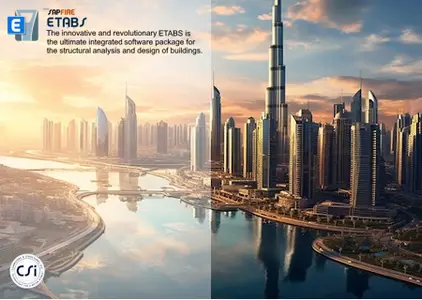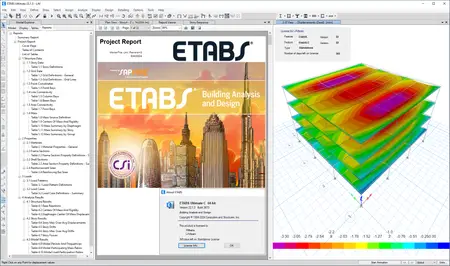
Free Download CSI ETABS 22.1.0 Build 3673 | 897.2 mb
Computers and Structures, Inc. (CSI), is pleased to announce the availability ofETABS 22.1.0 (3673). This release adds the AISC 360-22/AISC 341-22 steel frame, composite beam, composite column, and connection design. CSA S16-2019 composite column design has also been added, as well as updates for the latest SJI-2020 joist design
Owner:Computers and Structures, Inc. (CSI)
Product Name:ETABS
Version:22.1.0 (3673)
Supported Architectures:x64
Website Home Page :www.csiamerica.com
Languages Supported:english
System Requirements:Windows *
Size:897.2 mb
.
For those working with steel-framed floor systems, serviceability assessment of these floors subjected to walking vibrations has been added following Chapter 7 of the AISC Steel Design Guide 11. ETABS now includes automatic generation of nonlinear hinges per ASCE 41-23 (Ch 9 for steel, and Ch 10 for concrete). In addition, the ETABS API now supports .NET 8.
ETABS 22.1.0 Enhancements - Date: 13-Jul-2024
10619 The version number has been changed to v22.1.0 for a new intermediate release
10637 An enhancement has been made to ACI concrete codes "ACI 318-14" and "ACI 318-19" for torsion design if redistribution of torsion and forces are identified. The members for which redistribution is identified are designed for a torsion maximum of Tu and phi * Tcr per section ACI 318-14 22.7.3 and ACI 318-19 22.7.3. The members for which redistribution is not identified are designed for a torsion Tu obtained from analysis. If a member is overwritten with a reduction factor for torsional stiffness or if the member is assigned a section for which a reduction factor for torsional stiffness is applied, it is considered to redistribute torsion.
10634 An enhancement has been made to the steel frame design code AISC 360-22 in which the expression for the Cb factor for singly symmetric I-shapes has been modified to include the effect of singly symmetric I-shape parameter, Rm, per AISC commentary equation C-F1-3. The manual has been updated accordingly. In addition, the manual has been updated to include the effect of axial tension on Cb per AISC section H1.2, where Cb is amplified by a factor sqrt(1+alpha*Pr/Pey). The program was correct regarding the latter effect.
2267 An incident was resolved where tabulated values for joint reactions were not being displayed in the GUI for restrained joints that are internally created because of auto meshing. Joint reactions as arrows were being shown for internal joints as expected
2401 An enhancement was made to use Mander confined concrete curves based on transverse reinforcement data specified in the concrete frame section for program-generated Fiber hinges. The Mander confined concrete curve will be generated for fiber hinges assigned to frames which have a Concrete Rectangular or Concrete Circular type frame section and a Mander type concrete material, using the rebar and confinement information specified as part of the frame section properties. When viewing the generated fiber hinge, the Mander confined material name will indicate the frame section which it is associated with. This enhancement does not apply to section designer sections and does not use rebar and confinement data from Concrete Frame Design, but will be expanded to include these at a later time.
10642 An enhancement has been implemented whereby two new wide flange sections, W14X930 and W14X1000 (metric designation W360X1384 and W360X1488), have been added to the ArcelorMittal_US_ASTM-A913, ArcelorMittal_US_ASTM-A913M, ArcelorMittal_US_ ASTM-A992, and ArcelorMittal_US_ASTM-A992M frame section libraries.
10604 An incident was resolved where the database table for Frame Tension/Compression Limit assignment was not generated if a model only had one or more frames with both tension and compression limits assigned at the same time. There was no issue generating the table if the model had frames with only tension or compression limit assigned.
10657 An incident was resolved where all selected objects would get deselected when menu for interactive editing was invoked. This prevented interactive editing of items for only the selected objects. This issue only affected v22.0.0.
10683 An incident affecting composite beam design overwrites was resolved. The items labeled beff left and b-eff right in the Composite Beam Overwrites form did not refer as expected to the left-side and right-side deck effective widths used to compute composite beam properties. Instead, they referred to half the distance to the nearest approximately parallel beam or to the distance to the nearest slab edge as may be the case on the left or right side of the beam (the "deck widths" for short). While deck widths place an upper limit on effective widths, effective widths are also limited by beam spans and their value may also take into account the beam flange widths and other code dependent items. The items labeled b-eff left and b-eff right in the Composite Beam Overwrites form now refer to the effective widths as expected, with the deck widths also displayed but not editable. This incident affected all versions of ETABS capable of designing composite beams. When a confusion occurred, the effective width used by ETABS was always smaller than the user- specified overwrite and its value was documented in the design output.
10685 An incident was resolved for shear wall design where shear design and boundary element checks were using the forces for the entire pier instead of forces in a leg when multiple legs were present. This issue only occurred in v22.0.0 and previous versions were not affected.
10626 An incident has been resolved for the AISC ASD 89 steel frame design in which the lateral factor was always taken as 1.333 for design combos having seismic loads. It is now taken from the design preferences.
10666 An incident has been resolved in Canadian steel frame design codes "CSA S16-14" and "CSA S16-19" in which the program made an error in calculating the effective area, Aeff, when the section is a Class 4 section in the axial compression mode for the web being slender (h/tw > 670/sqrt(Fy)). The reduction in area for the web is b_reduction * t, where t should be taken as tw, while SAP2000 used t=tf. Since tf is typically greater than or equal to tw, this correction will increase the value of Aeff slightly, and the program was conservative. This change affects the axial force capacity of slender I-shapes when the web is slender. All other sections remain unaffected.
10705 An incident was resolved where program was crashing while changing the number of bolts in connection design overwrites.
10655 An incident was resolved where importing a DXF file for architectural plan was causing an error condition for some models.
10669 An incident was resolved where Summary Report was not working when User interface was in Chinese language. This issue was only present in v22.0.0.
10682 An incident has been resolved for the exporting and importing model file with the Eurocode 2-2004 composite column design and the Eurocode 2-2004 and Italian NTC 2008 concrete frame designs. For the Eurocode 2-2004 composite column design, importing model text or .XLSX file shows error message for PLUGWELDED, WELDINGTYPE, and RHSSSTHICK design parameters while these are not available in the Preference form nor used in the design. For the Eurocode 2-2004 and Italian NTC 2008 concrete column designs, importing model .XLSX file shows error message for the Tan(Theta) value even though it is 1.0, which is within the allowed range of 0.4 and 1.0. Now, these error/warning messages are fixed.
10679 An incident was resolved in DirectX graphics where viewing wall using color by "Section Properties" in the deformed shape and running animation was showing the wall using black color.
10631 An incident was resolved where displaying the tendon "Vertical Profile Control Points" in the Display > Set View Options was causing an abnormal termination. This was an issue in v22.0.0 only.
10643 An incident was resolved where the BU I Cover plate rendering for frame sections was not correctly displayed. No results were affected.
10650 An incident was resolved where exporting tables to Excel in Chinese language was causing an abnormal termination. This issue only affects v22.0.0.
10652 An incident was resolved where adding a support to a tendon was causing an error condition. This issue was only present in v22.0.0 and previous versions were not affected.
10677 An incident was resolved where modifying grids using right mouse click > Modify/Show Grids > click on Reference Planes button and use Escape was causing an error condition.
10678 An incident was resolved for DirectX graphics where drawing a new wall and using mouse wheel pan was not showing the section label in plan view if wall sections were displayed prior to wall drawing.
10681 An incident was resolved where deleting all time history function or response spectrum function disabled time history/response spectrum function tool buttons.

ETABSis an engineering software product that caters to multi-story building analysis and design. Modeling tools and templates, code-based load prescriptions, analysis methods and solution techniques, all coordinate with the grid-like geometry unique to this class of structure. Basic or advanced systems under static or dynamic conditions may be evaluated using ETABS. For a sophisticated assessment of seismic performance, modal and direct-integration time-history analyses may couple with P-Delta and Large Displacement effects. Nonlinear links and concentrated PMM or fiber hinges may capture material nonlinearity under monotonic or hysteretic behavior. Intuitive and integrated features make applications of any complexity practical to implement. Interoperability with a series of design and documentation platforms makes ETABS a coordinated and productive tool for designs which range from simple 2D frames to elaborate modern high-rises.
CSI ETABS Tutorials
Founded in 1975,Computers and Structures, Inc. (CSI)is recognized globally as the pioneering leader in software tools for structural and earthquake engineering. Software from CSI is used by thousands of engineering firms in over 160 countries for the design of major projects, including the Taipei 101 Tower in Taiwan, One World Trade Center in New York, the 2008 Olympics Birds Nest Stadium in Beijing and the cable-stayed Centenario Bridge over the Panama Canal. CSI's software is backed by more than three decades of research and development, making it the trusted choice of sophisticated design professionals everywhere!
CSI ETABS 22.1.0 (3673) Win x64 Torrent Download , CSI ETABS 22.1.0 (3673) Win x64 Crack Download , CSI ETABS 22.1.0 (3673) Win x64 Patch Download , CSI ETABS 22.1.0 (3673) Win x64 Serial Keygen Download
